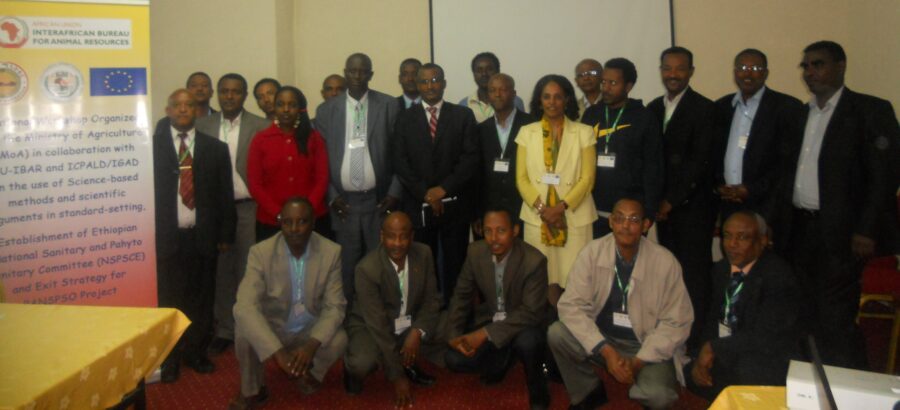ETHIOPIAN NATIONAL SPS COMMITTEE ESTABLISHED AND TRAINING WORKSHOP ON SANITARY & PHYTOSANITARY (SPS) CONDUCTED
Non-compliance with world animal and plant health and food safety standards is deemed as a major barrier to accessing international agricultural trade and thereby denying countries the exploitation of the competitive advantage of their locally produced commodities, thus missing out on the potential benefits. The IGAD Centre for Pastoral Areas and Livestock Development (ICPALD), in collaboration with African Union Inter-African Bureau for Animal Resources (AU-IBAR), organized a national training workshop in Addis Ababa, Ethiopia from July 20-22. The workshop had the following specific objectives:
- To provide training to public and private sectors’ representatives on the use of science-based methods and scientific arguments in standard-setting and on some principles of the SPS Agreement of the WTO
- To establish national SPS committee, discuss and adapt the ToR
- To propose exit strategy and road map for strengthening the national SPS committee
The training workshop involved 31 participants from both the public and private sectors of in Ethiopia involved in Animal Health, Plant health and Food Safety works. The welcoming remarks were given by Dr. Ameha Sebsibe, head of livestock on behalf of ICPALD Director and by Dr. Raphael Coly, on behalf of the AU-IBAR Director, and opening remark was delivered by H.E. Dr. Gebregziabher G/Yohanis, Livestock State Minister, MOA, Ethiopia. In their remarks noted that SPS are critical to protect human from unsafe food. They also indicated that poor participation of Africa Nations in international standard setting and lack of compliance to SPS measures have been major challenges in livestock and livestock product trade development. The Minister also commended the two institutions for organizing this important event for both public and private sectors and confirmed that Ethiopian government committed to support useful structures such as the National SPS committee
The training covered the following important topics; The WTO SPS agreement; general aspects of the organisation and main principles of the SPS agreement, The OIE : Presentation on the organization – Standard setting process, The Codex Alimentarius Commission: Presentation on the organization – Standard setting process, The IPPC: Presentation on the organization – Standard setting process, Risk analysis, Cost Benefit Analysis and its use in the application of SPS measures and Principles of negotiation. Moreover, good practises video on trading safely was shown and discussed.
The main recommendations include: acknowledging the phasing out of PANSPSO Project end of this year, identified priority interventions with time line and estimated budget need to be submitted to Livestock State Minister, MOA (the hosting organization for the national SPS committee-NSPSC) ; legal text that enable official recognition of the NSPSC be drafted and submitted to government; the NSPSC enhance inter-sectoral collaboration in Ethiopia and strengthen participation during the standard setting process of CODEX, OIE and IPPC






